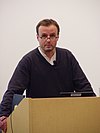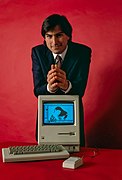Portal:Internet
The Internet PortalSelected article
Opera is a web browser and Internet suite developed by the Opera Software company. Opera handles common Internet-related tasks such as displaying web sites, sending and receiving e-mail messages, managing contacts, IRC online chatting, downloading files via BitTorrent, and reading web feeds. Opera is offered free of charge for personal computers and mobile phones, but for other devices it must be paid for. Features of Opera include high performance, tabbed browsing, page zooming, mouse gestures, and an integrated download manager. Its security features include built-in phishing protection, strong encryption when browsing secure web sites, and the ability to delete private data such as cookies and browsing history by clicking a button. Opera runs on a variety of personal computer operating systems, including Microsoft Windows, Mac OS X, Linux, FreeBSD, and Solaris. Although evaluations of Opera have been largely positive, Opera has had limited success on personal computers. It is currently the fourth most widely used web browser for personal computers, behind Internet Explorer, Mozilla Firefox, and Safari. Opera has a stronger market share, however, on mobile devices such as mobile phones, smartphones, and personal digital assistants.
Selected pictureA portmanteau of emotion (or emote) and icon, an emoticon is a symbol or combination of symbols used to convey emotional content in written or message form. News
Wikinews Internet portal
WikiProjects
Did you know (auto-generated) -
Selected biography
Douglas C. Engelbart (born January 30, 1925 in Oregon) is an American inventor of Swedish and Norwegian descent. As a World War II naval radio technician based in the Philippines, Engelbart was inspired by Vannevar Bush's article "As We May Think". Engelbart received a Bachelor's degree in electrical engineering from Oregon State University in 1948, a B.Eng. from UC Berkeley in 1952, and a Ph.D. in EECS from UC Berkeley in 1955. At Stanford Research Institute , Engelbart was the primary force behind the design and development of the On-Line System, or NLS. He and his team at the Augmentation Research Center developed computer-interface elements such as bit-mapped screens, groupware, hypertext and precursors to the graphical user interface. In 1967, Engelbart applied for and later received a patent for the wooden shell with two metal wheels (computer mouse). Engelbart later revealed that it was nicknamed the "mouse" because the tail came out the end. He would also work on the ARPANET, the precursor of the Internet. In later years he moved to the private firm Tymshare after SRI was transferred to the company. McDonnell Douglas took over the copany in 1982, and in 1986 he left the company. As of 2007, he is the director of his own company, the Bootstrap Institute, which founded in 1988 and located in Fremont, California.
General images -The following are images from various internet-related articles on Wikipedia.
Selected quoteMore Did you know...
Main topics
Featured contentCategoriesRelated portalsThings you can do
Associated WikimediaThe following Wikimedia Foundation sister projects provide more on this subject:
Wikipedia's portals |























































